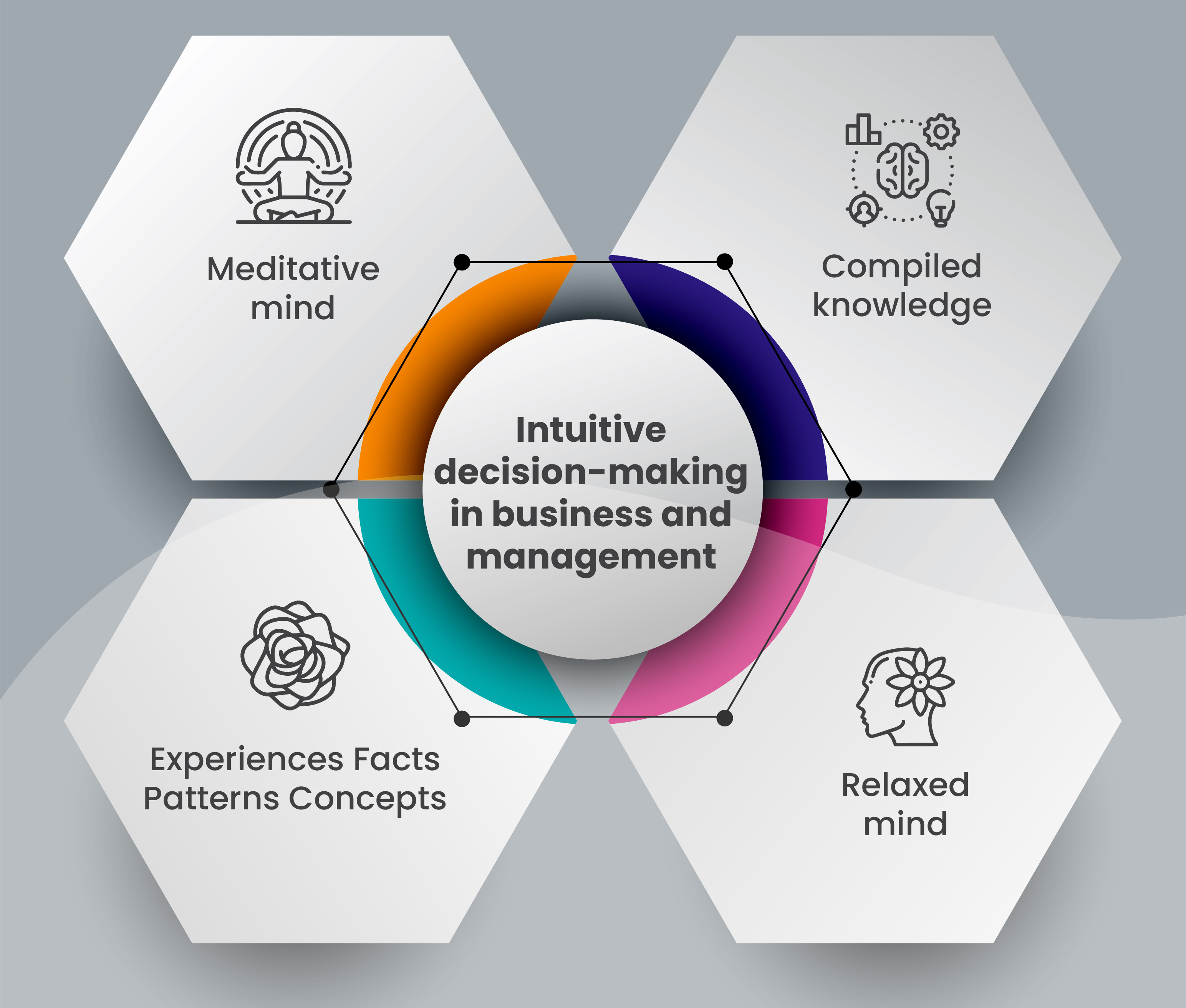Did you know that before independence, entrepreneurial activity in India was confined to particular traditional business communities like the Marwaris and Banias? The factors that enabled these entrepreneurs to carry on their businesses included intuition and the ability to utilize opportunities.

Intuition is the faculty of knowing or understanding something without conscious reasoning or proof. It allows us to make decisions from a hidden space of clarity and knowingness.
What is the need for intuition in decision-making in business and management?
Rational analysis is beneficial but is not enough for decision-making. While rational analysis is like the bricks of a wall, intuition is the mortar. In today’s fast-moving world, making quick decisions is vital for any business to be successful. A delay in decision-making may give an opportunity to the competitors to win. Under those circumstances, it is not always possible to generate empirical data for making decisions.
The role of intuition in business and management and ways to develop it is showcased in the video, “Intuitive ability” - Wisdom talk by Gurudev Sri Sri Ravi Shankar.
Research reveals
Weston H. Agor, Harvard researcher, author and editor, studied two thousand managers over a period of two years. He calls intuition a way of knowing. His research revealed that executives used intuition like ‘explorers’ to ‘foresee’ the correct path to follow.
In a study of thirteen thousand business executives by the Harvard researcher Parikh (1996), executives credited 80 percent of their business success to relying on their intuition.
Gary Klein, Psychologist, Senior scientist - Macrocognition LLC, and a Decision-making consultant, notes (2003) that an increasing number of top-level managers, including CEOs, are openly admitting to the use of ‘gut feeling’ or intuition in their decision-making.
Gopalakrishnan (2007), the ex-executive director of Tata Sons, stresses that intuition, and not rational analysis, is the key to becoming an effective leader. After all the analysis, intuition should take over. He reminds us that adding an overlay of intuition to logical analysis is wisdom in business.
Examples of intuitive decision-making in business

Xerox got rid of its marquee products based on an intuitive edge
Ursula Burns, ex-CEO (2009-2016) of Xerox, took pride in the company's rich heritage and famous products. Yet she was not nostalgic about the past because she wants to build a new future for Xerox. She intuitively escaped the trap that spelled Kodak's demise (its lack of strategic creativity led it to misinterpret its line of work). That comprised outsourcing, manufacturing and cutting back or eliminating marquee products. She moved her company into the digital era, such as business process management, thereby reinventing Xerox, based on her intuitive abilities, as a high-tech solution provider. Business services was a smart area to work in, with dependable income even in worse situations. By her calculations, it was a potential “$500 billion marketplace.” And Xerox’s advantages in getting a large portion of that pie were attributed to its innovative capabilities and intuitive decision-making.
Mukesh Ambani: the power of intuitive edge
The evolution of Reliance Industries Limited is unusual in the region's corporate history: it transitioned from textiles and polyester to oil, then to consumer products and digital. This shift has been quick under Mukesh, which is why there is a saying on Dalal Street that if data is the new oil, the only man who has comprehended it clearly to reorient his business plan is the captain of a heavy industrial firm. This transformation is nothing short of amazing. Reliance has demonstrated that innovation is their way of life. Without intuition there are no inventions, there are no innovations and there are no discoveries.

“Investing in the business of the future is the key,” Mukesh Ambani reiterates. Business and economic environment and importantly one’s foresight give you a hint of the future business.
Which decision-making approach can’t do without intuition?
To zero in on a decision-making approach, consider two dimensions: the urgency and size or impact of the decision. Autocratic, Participatory, Democratic and Consensus-based are the different decision-making approaches. The autocratic approach is for situations where you have a low impact on business and involves a small decision. The democratic approach is for mid-sized decisions involving less urgency. The consensus approach is for the huge decision but doesn't involve an emergency. Intuition comes into action in the participatory decision-making approach, where big and quick decisions at high risk can highly impact your business. Intuition enhances analytic thinking and focuses on the present situation, providing insights into timing, specific strategy and innovation.
What is intuitive decision-making based on?

Intuitive decision-making is based on compiled knowledge communicated to the conscious mind through unconscious understanding.
Intuition is a highly complex and developed form of reasoning that depends on years of experience and learning, facts, patterns, concepts, procedures and abstractions stored in one’s head.
Above all, intuitive decision-making depends on the state of mind. A relaxed mind is the mother of all innovations.
A meditative state of mind can tap the source of intuition. If your likes and dislikes disturb you, then your novel ideas, thoughts and feelings get camouflaged behind them. Meditation rids you of these disturbances.

Know the powerful breathing technique, Sudarshan Kriya and guided meditation that reduces stress and improves intuitive abilities at The Art of Living Online Meditation and Breath Workshop.
Related links
Intuition - Wisdom talk by Gurudev Sri Sri Ravi Shankar.
Reference links
Evolution of entrepreneurship in India: Emergence from local to global business leadership
The Indian journal of industrial relations: Intuitive decision-making in business
Inspired by Gurudev Sri Sri Ravi Shankar’s wisdom talks
Written by: Pratibha Sharma
FAQs
Firefighters, tank platoon commanders, and neonatal intensive care nurses work in fast-paced and high-stakes jobs, and for whom intuition comes in handy.
Don’t confuse your desires with intuition.
















